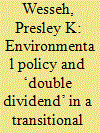|
|
|
Sort Order |
|
|
|
Items / Page
|
|
|
|
|
|
|
| Srl | Item |
| 1 |
ID:
116736


|
|
|
|
|
| Publication |
2012.
|
| Summary/Abstract |
This contribution investigates causal interdependence between energy consumption and economic growth in Liberia and proposes application of a bootstrap methodology. To better reflect causality, employment is incorporated as additional variable. The study demonstrates evidence of distinct bidirectional Granger causality between energy consumption and economic growth. Additionally, the results show that employment in Liberia Granger causes economic growth and apply irrespective of the short-run or long-run. Evidence from a Monte Carlo experiment reveals that the asymptotic Granger causality test suffers size distortion problem for Liberian data, suggesting that the bootstrap technique employed in this study is more appropriate. Given the empirical results, implications are that energy expansion policies like energy subsidy or low energy tariff for instance, would be necessary to cope with demand exerted as a result of economic growth in Liberia. Furthermore, Liberia might have the performance of its employment generation on the economy partly determined by adequate energy. Therefore, it seems fully justified that a quick shift towards energy production based on clean energy sources may significantly slow down economic growth in Liberia. Hence, the government's target to implement a long-term strategy to make Liberia a carbon neutral country, and eventually less carbon dependent by 2050 is understandable.
|
|
|
|
|
|
|
|
|
|
|
|
|
|
|
|
| 2 |
ID:
169734


|
|
|
|
|
| Summary/Abstract |
Although the environmental benefit from implementing a climate tax is usually realized, the economic dividend still remains a controversial issue warranting further research. This is because the impact of an environmental policy on an economy-wide system will depend on factors that differ from one region to the next. In this paper, we develop a static CGE model for Liberia that is capable of analyzing both a uniform and a partial carbon tax policy. Under the uniform policy instituted to ensure mitigation in the range of 20–50%, an economic dividend is found for energy, employment, and welfare. In particular, energy consumption increases by between 5 and 15.5%, respectively. Interestingly, under a second best policy which exempts economically strategic sectors from the tax, no economic dividend is found for all three variables. This time, energy use declines by between 2 and 9%. These suggest that a uniform environmental tax policy is a more viable option for Liberia, in particular, as it does not only generate economic dividend for employment and welfare, it also incentivizes Liberia's adoption and use of renewable energy technologies. In general, based on the results obtained, further conditions for the feasibility of a double dividend are proposed.
|
|
|
|
|
|
|
|
|
|
|
|
|
|
|
|
| 3 |
ID:
185700


|
|
|
|
|
| Summary/Abstract |
There is a growing recognition that local electricity markets (LEMs) for distributed power resources are technically and economically feasible. However, the conditions under which these markets can create value for prosumers and consumers (P&C) and ensure overall welfare for society are insufficiently understood. To help address this literature gap, this paper takes China as a case to study a local electricity market that is driven by peer-to-peer trading. The results show that peak-valley tariffs increase cost-savings for P&C at the expense of grid revenue and the larger the peak-valley spread, the greater the benefits to P&C and, hence, losses to the grid. In addition, the study finds that the value of solar PV declines when deployment of solar technology increases linearly with storage installation in the market. Because the declining value of variable renewable energy may be especially problematic in wholesale electricity markets (WEMs), this study argues that as long as storage installation increases at a faster rate than variable renewable energy deployment, LEMs that operate independent of the central grid can potentially offer a more cost-effective option for large-scale renewable energy utilization. These results underscore the importance of government policies that seek to promote the development of LEMs.
|
|
|
|
|
|
|
|
|
|
|
|
|
|
|
|
|
|
|
|
|